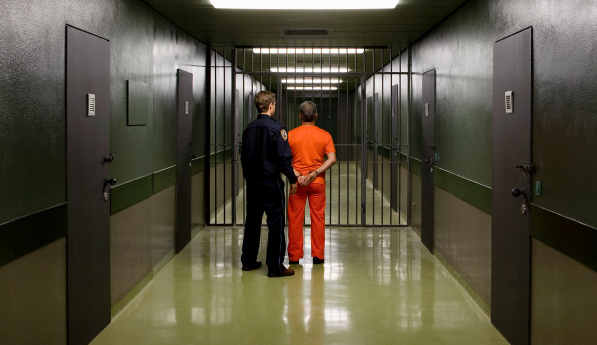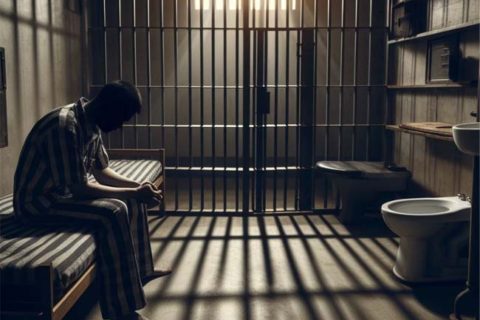Correctional officers have to oversee and manage individuals who are being detained. That detention may be for short periods of time, such as before a court hearing, or for the long-term, as will be the case with an inmate serving a prison sentence.
Submitting a profession as unique as corrections necessitates extensive training and education. But a formal degree is not needed, instead, focused training, both on-the-job and at special academies, will be able to teach correctional officers everything they need to know about handling detainees. By the way, how long does it take to become a Correctional Officer? Well, this guide will give you an overview of correctional officer careers and what it takes to become one.

What Does a Correctional Officer Do?
The job of Correctional Officer involves supervising prisoners, implementing rules and maintaining order in the correctional facilities. Correctional Officers are needed to prevent any disturbances, potential assaults and attempts to escape from the prisons. Also, Correctional Officers help in the rehabilitation and counseling of convicts along with supervision of their daily tasks. Aside from that, the Correctional officers are also responsible for inspecting prison facilities and ensuring they are maintained, suggesting improvements and searching inmates for possession of any illegal items.
How Long Does It Take to Become a Correctional Officer?
Need to know that the time it takes to become a Correctional officer will vary. From working for local prisons which may need only a high school diploma to working for federal prisons that may need a 4-year college degree, it will take serious time commitment to become a Correctional officer. Aside from that, you are looking at on-the-job training that may last for weeks, if not months. All in all, you are going to need to invest time, effort and money in getting the right education, experience and qualifications to be a correctional officer.
Now, you understand the nature of the job of a correctional officer, you are going to realize that it needs a certain degree of training and education to be able to work in a prison setting. The job comes with lots of perils and dangers. Thus, it is necessary that you prepare yourself accordingly.
To understand the timeline to be a correctional officer, let us break down the process into the below:
- Education (up to 4 years):
Correctional officers will need at least a high school diploma or a GED to be eligible for application. Several state or local prisons might need college credits. But by-and-large, high school diplomas are considered enough for entry-level positions. However, for those who are looking for employment in federal prisons, the requirements will be slightly different. Here, a high school diploma may not be sufficient. You are going to need at least a bachelor’s degree for an entry level job in federal prisons. Although any major is considered acceptable, it will be ideal if you get a bachelor’s degree in a related subject, such as criminal justice. Usually, this degree would take four years to complete. - Training (6 to 12 months):
After being hired as a correctional officer, then you are going to be required to join a training academy. Those programs are offered at the local, state and federal levels through private companies. They are specially designed to teach correctional officers the operations of their institutions, custody and security policies and other regulations. The training program can last approximately 6 to 12 months, depending on local laws and policies of the prison you want to work at. - Experience requirements (up to 3 years):
Although this is not a compulsory requirement in most cases, but it does become necessary for the applicants to federal prisons. If you are applying to work in a federal prison and do not have a bachelor’s degree, you are going to need to have at least 3 years of relevant and full-time experience. This experience is able to be in fields such as teaching, supervising or counseling. Also, several non-federal agencies might have a minimum college education or relevant experience requirement. - On-the-job training (200 hours):
In addition, Correctional officers are also needed to complete a certain number of hours of on-the-job training. This will last a few weeks or months at local or state facilities. But in federal facilities, the on-the-job training requirement is at least 200 hours within the first year of employment. Correctional Officers are trained in self-defense, firearms use and also taught regulations regarding dealing with prisoners on a daily basis. The amount of time needed to become a correctional officer is dependent on the state you are applying in and the type of facility you plan on working at. Local prisons might not need a lot of time for entry level positions, but the education, training and experience requirements for federal prisons will need a certain amount of time investment.
Career Advancement Options
For correctional officers who intend to apply for advanced positions, there are some options for continuing education. A professional certification can be obtained through the American Correctional Association (ACA), called the Certified Correctional Officer (CCO). Most advancement options will need additional education or experience to get promotions. Correctional Officers may get promoted to supervisory roles, such as correctional sergeant that involves the supervision of other correctional officers and maintaining overall security in the facility. Several Correctional officers might advance to the position of a warden if the relevant qualifications and requirements are met. Correctional officers holding college degrees may have better chances for advancement.
The Difference Between a Correctional Officer and A Police Officer
Some of you may want to know the difference between a Correctional officer and a police officer. Need to know that the Correctional officers and police officers are both uniformed officials. Usually, the Correctional officers work in jail and prisons. They guard people who have been convicted of crimes committed, while the police officers, they work in the community. The police officers usually seek to identify the perpetrators of the crimes.

A bookworm and researcher especially related to law and citizenship education. I spend time every day in front of the internet and the campus library.




